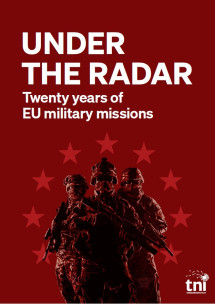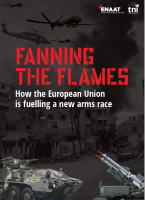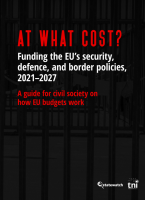Under the Radar Twenty years of EU military missions
In 2003, the EU deployed its first-ever foreign mission to the former Yugoslav Republic of Macedonia. In the 20 years since then it has undertaken more than 40 operations across Europe, Africa and Asia with 24 currently active, 13 of which are civilian, 10 of which are military and are the focus of this report, as well as one hybrid mission. The stated objectives of these missions include laudable aims, such as preventing conflict, strengthening international peace and security, supporting the rule of law, and crisis management, among others. According to the EU’s diplomatic service these missions are driven by the EU’s commitment to improving the security situation in host nations. They are described as low to middle intensity, offering EU services that are tailored to local circumstances and usually involve the provision of military training and equipment to national armies. In reality, as this report shows, these missions have little to do with ‘promoting peace, prosperity and security’, and are rather far more concerned with achieving the EU’s final stated aim of promoting ‘the interests of Europeans’ to the detriment of local populations in host states.

Downloads
Authors
Summary
At the time of writing in May 2024 preparations are underway across the 27 member states of the European Union (EU) for parliamentary elections to be held in June. Among the issues that may sway voters on polling day is the EU’s public embrace of war politics, which has been at the forefront of events in Brussels during the previous five-year cycle. The EU’s response to Russia’s invasion of Ukraine, and more recently to Israel’s genocide in Gaza, has not gone unnoticed by Europeans, many of whom have taken to the streets to protest the EU’s complicity in war and genocide. Far from public view, however, the EU has, in fact, been driving a war agenda for decades. Its deadly borders regime has led to the deaths of tens of thousands of people desperately seeking asylum, while others have been detained, tortured, enslaved or disappeared in third countries as a result of policies enacted in Brussels. Similarly, the EU has channelled tens of billions of euros to militarised policies, much of which funds the supply of arms to warzones or lines the pockets of lucrative companies that produce lethal arms. Furthermore, for the past two decades, the EU has been deploying military-mandated missions overseas that have gone virtually under the radar and generally evaded public scrutiny. This research sheds light on these missions.
In 2003, the EU deployed its first-ever foreign mission to the former Yugoslav Republic of Macedonia. In the 20 years since then it has undertaken more than 40 operations across Europe, Africa and Asia with 24 currently active, 13 of which are civilian, 10 of which are military and are the focus of this report, as well as one hybrid mission. The stated objectives of these missions include laudable aims, such as preventing conflict, strengthening international peace and security, supporting the rule of law, and crisis management, among others. According to the EU’s diplomatic service these missions are driven by the EU’s commitment to improving the security situation in host nations. They are described as low to middle intensity, offering EU services that are tailored to local circumstances and usually involve the provision of military training and equipment to national armies. In reality, as this report shows, these missions have little to do with ‘promoting peace, prosperity and security’, and are rather far more concerned with achieving the EU’s final stated aim of promoting ‘the interests of Europeans’ to the detriment of local populations in host states.
While the EU’s overseas missions are relatively small in terms of personnel and presented as low-level interventions, their impact over the previous 20 years has, at best, had no impact in resolving conflict, or served to exacerbate it – the latter being the case in most of the missions examined as part of this research. In the case of Bosnia and Herzegovina (BiH), which hosts the EU’s most long-standing mission, underlying tensions rooted in unresolved political questions have not been – nor could they ever have been – resolved by deploying military personnel. Moreover, as previous TNI research has shown, for decades the EU has treated the Balkans as its own backyard, using it as a testing ground for border and security strategies that are honed and perfected before being deployed elsewhere. The EU’s military presence in the Balkans may, therefore, be better understood as a self-serving mission for EU interests, rather than being focused on the needs of the local population.
There is no standard methodology to assess the effectiveness of EU missions, and evaluations as well as the decision-making process to launch new missions appear to take place in an ad hoc manner. The material on which this research draws shows that even the EU admits that it has achieved few of its stated aims. Even so, it continues to approve and deploy missions that in a best-case scenario have no impact beyond costing millions to European taxpayers, and indeed often contribute to destabilising the very contexts that they have been tasked with securing. The Sahelian region, where the EU has deployed seven military missions over the last two decades, is a case in point. Since the EU began deploying such missions, coups d’état have become commonplace, not only in the countries where there are EU missions but also in neighbouring states. Clearly, the EU presence cannot be held solely responsible for these events but it certainly raises questions about its stated aim of preventing conflict and strengthening security, especially since some of these missions provided financial support to the armed forces involved in the coups. Moreover, across the Sahel global power struggles play out through the presence of an array of actors including troops from the US, EU member states, and African countries, all operating under different national, regional and United Nations (UN) mandates, as well as the presence of the Russian state-supported Wagner Group and its successor.
For the last 20 years, military personnel operating under the aegis of the EU have trained tens of thousands of troops across Africa, many of which have subsequently perpetrated serious human rights violations or participated in military coups. Mozambique is perhaps the most recent and most notorious example, but it is far from exceptional. Similarly, tens of millions were channelled to the Nigerien national army, with a tranche worth €5 million for the purchase of lethal weaponry transferred in the weeks immediately preceding the coup d’état in 2023. Regardless of the states to which the EU supplies arms or the guarantees given, the reality of the arms trade is that once lethal weaponry leaves the EU, it cannot be tracked and controlled and there are no effective mechanisms to prevent its being used to perpetrate human rights violations, to violently curb dissent, or to enforce military rule. Moreover, the governments with which the EU collaborates are often embroiled in serious allegations of corruption or have a very poor record on human rights; and yet, despite its own stated principle of upholding the rule of law, the EU has continued to hand over tens of millions to often corrupt, authoritarian or volatile governments for investment in military training and equipment. This is reckless and irresponsible and a betrayal of the values that the EU claims to uphold.
Despite its poor track record in bringing about peace and stability, the EU has forged ahead with deploying its missions, eager to defend its economic interests and present itself as a relevant actor on the global stage. The EU’s two Somali-focused missions operating on land and patrolling coastal waters have indeed contributed to exacerbating the problems that they were mandated to alleviate, and culminated in driving people from their livelihood of small-scale fishing directly into the hands of non-state armed groups. Moreover, the EU’s most recent mission in the Red Sea, launched in response to Houthi disruption of shipping lanes to bring pressure to bear on Israel’s assault on Gaza, is a further example of the EU protecting its own interests while projecting itself as a reliable actor in the Western axis of power. It is noteworthy that the only concrete action the EU has taken in relation to Gaza was the deployment of this mission, which has done nothing to address Israel’s genocidal war on the Palestinian people.
For years the EU has evolved legally and politically into a militarised union, developing a common foreign and security policy that has allowed it to portray itself as an emerging global power in its own right, of which these missions are the tangible expression. This image is completely at odds with reality, however. Since 2002 the EU, through the Berlin Plus Agreement, has had formal relations with NATO and, as this research shows, many of these missions are intertwined with NATO and/or US operations. It has become abundantly clear since Russia’s full-scale war on Ukraine and Israel’s genocidal war on Gaza, that the EU has no intention of setting out its own independent political agenda and using whatever political clout it might have to push for diplomatic solutions. Rather, it has fallen into line with the US agenda, and any slight differences have been purely rhetorical with the actions of NATO-affiliated entities on both sides of the Atlantic remaining broadly aligned. This is unsurprising given that there are US military bases located across EU member states, some of which – as well as the UK – host US nuclear weapons. While the EU’s military power pales in comparison to that of the US, it continues to ‘play catch-up’ and forge ahead with plans to become a ‘hard power’ actor rather than seeking to provide a counterweight by promoting diplomacy. This stance is unsurprising given that some of the EU member states were central in the colonisation of Africa, Asia and the Americas, and continue to operate from a colonialist, imperialist logic today, as evidenced in the approach taken towards Israel, a settler-colonial state. The regime of economic extraction and the great power mentality has not changed and has been on full view in recent months.
The EU’s consolidation both as a regional power that deploys its own ‘peacekeeping’ missions, as well as its subservience to US interests, poses a direct challenge to multilateralism. Specifically, it serves to weaken, undermine and jeopardise the legitimacy and actions of the UN. Both the EU and the UN were born out of the ashes of World War II, when efforts were made to develop regional and multilateral institutions to protect future generations from the scourge of war. Though the UN system is far from perfect, it still offers the best opportunity to preserve multilateralism and to work out differences diplomatically rather than spiralling downwards towards military aggression and war. The only plausible reason for the EU and its member states to deploy their own missions, operating outside or on the margins of the UN’s experienced peace support operations, is that this makes it easier to achieve the stated aim of ‘promoting European interests’ and territorial control. This is borne out in the overlap between the locations where the EU has deployed military missions and the prevalence of natural resources or access to shipping lanes vital for protecting economic and commercial interests. If the EU were truly interested in building peace, it would support the multilateral structures that were designed to protect it, not directly undermine them by establishing parallel structures with scant oversight and accountability mechanisms. Through its actions, the EU is testing and stretching the limits of multilateralism at a time when international law and the structures that underpin it are hanging on by a thread.
Key findings
For two decades, the EU has been gradually moving towards becoming a de facto military power. This has happened beyond the sight of the European public, with scant oversight from democratic institutions or judicial accountability. This briefing critically reviews 20 years of the EU’s CSDP military missions, with a focus on the 10 most recent or current missions (at the time of writing all missions referenced appeared as active on the EEAS website, although some were temporarily suspended).
It finds the following:
The EU is expanding rapidly as a military power and consolidating its presence in African countries, especially in the Sahel region. The number of active military missions has doubled from five to ten since 2018. Similarly, the common costs (roughly 10-15% of the total costs) of these missions have almost doubled since 2019 and stand at €150 million for 2024.
While the official rhetoric suggests that the military missions are aimed at increasing stability in the respective countries, in reality the EU is driven by its own interests and the development of these missions and their deployment exemplifies a colonial logic, focused on controlling access to crucial raw materials, important trade routes, securing profits for the military-industrial complex, and the EU projecting itself as a ‘hard power’.
The EU chooses to prioritise short-term goals over addressing the root causes of violent conflicts. These can often be found in colonial power structures that benefit the EU and are perpetuated by it. Examples range from the extraction of raw materials, to overfishing that destroy local livelihoods, to the export of arms to authoritarian and violent regimes.
- Some of the soldiers trained by the EU missions have been responsible for severe human rights violations, as well as coup d’états, and some of them have joined non-state armed groups. In 2020, the Malian national security forces, which received training and finance from the EU, were responsible for the killing of hundreds of civilians. Many of the military missions have failed to increase security in the countries in which they are based and have often had detrimental effects.
- The countries most involved in military missions are often former colonial powers that want to maintain their influence in their former colonies. In six out of 11 missions before 2017 for which there is data, it was the former colonial power that provided the most troops, with France heading the list.
- Seven of the ten currently active missions take place on the African continent or in its waters, three of which are in the Sahel. The competition for access to resources and raw materials seems to be the key driving force behind the EU’s focus on the Sahel region.
- The military missions in both Mali and the Central African Republic (CAR) have been partially suspended since the end of 2021 – not because of the well-documented human rights violations perpetrated by state forces, but because it was discovered that the Russian state-sponsored private military Wagner Group was highly active in both countries, raising concerns that soldiers trained by the EU might join the militia. The partnership mission in Niger ended less than a year after it started because the new military government ordered European, French and US forces to leave the country.
- While ‘terrorism’ is often cited as the justification for US and EU military presence in the Sahel, evidence suggests a reverse causality – military interference provokes non-state armed groups, which in turn is used to justify further militarisation.
- Rather than learning from these past failures, the EU is busy establishing new missions in the Sahel and beyond.
- There is a severe lack of systematic evaluation of the missions regarding whether they achieved their stated aims as well as of the broader context of their deployment. Furthermore, they reportedly suffer a lack of personnel and resources, a high turnover of staff, bad coordination and insufficient information-gathering from the outset, and there seem to be no clear criteria for whether and when to launch a mission in a given country.
- Decisions on this seem to be taken ad hoc, under pressure of certain countries that have (oten neo-colonial) interests in the regions where the missions take place.
- The EU is establishing itself as a military power that is both part of, but also separate from, NATO, and that works in conjunction but also independent of member states. By doing this, the EU is undermining multilateral structures like the UN as well as national and regional states and systems.
- The missions suffer from a serious lack of democratic oversight and judicial accountability. The European Parliament, the only democratically elected European institution, has very limited decision-making power in relation to foreign policy. For several years, military missions have been financed through the European Peace Facility (EPF), an off-budget fund that is beyond any democratic scrutiny.
- The missions also escape judicial scrutiny, as there is no internal or external legal review of the CSDP in the EU – it falls neither under the jurisdiction of the Court of Justice of the EU nor the European Convention of Human Rights, which applies only to states. There is also a lack of publicly available information about matters such as detailed expenses, the number of casualties, and others.
- The conflicts in the countries where the missions take place have already led to forced displacement and are expected to drive even more people from their homes, contrary to the EU’s stated aim of ‘fighting the root causes of migration’. Some of these people will once again be confronted with EU military apparatus when they try to cross the increasingly militarised borders into the EU.



